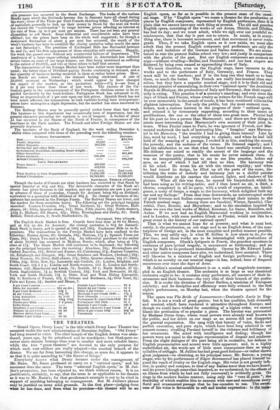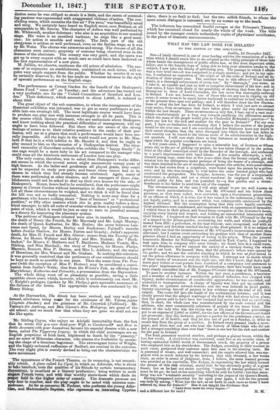THE THEATRES.
" Grand Opera, Drury Lane," is the title which Drury Lane Theatre has assumed under the new administration of Monsieur Jullien. " Old Drury " had long ceased to exist. The chief temple of the English drama was aban- doned, years ago, by its priesthood and its worshipers: but Shakspere re- ceives more sincere homage than ever in smaller and more suitable fanes; while the two "great theatres" are devoted to the only purpose for which such vast edifices are really adapted—the musical branch of the drama. We are far from lamenting this change, as some do; it appears to us that it is quite according to "the fitness of things."
Everybody knows what Drury became under the management of Mr. Bunn. Mr. Bunn professed to carry on a " national opera," and his successor does the same. The term "national English opera," in M. Jul- lien's prospectus, has been objected to, we think without reason. It is no justification, certainly, to say, that the term is as applicable to his theatre as it was to Mr. Bunn's; for that gentleman's example is not to be cited in support of anything belonging to management. But M. Jullien's phrase may be justified on more solid grounds. In the first place—judging from what he has done, and from what he promises—his theatre will be 4n
English opera, as far as is possible in the present state of the musi- cal stage. If by " English opera " we mean a theatre for the production of pieces by English composers, represented by English performers, then it is plain that we cannot have any such thing at present. The old and genuine English opera, consisting of the works of our Ames, Shields, and Dibdius, has had its day; and we must admit, while we sigh over our youthful re- miniscences, that that day is past not to return. In music, as in every- thing else, there is incessant movement, and that movement is never retro-
grade. Then, if we take English opera as it now exists, we must also admit that the present English composers and performers are only the pupils and imitators of the German and Italian masters. We are accus- tomed to rate the present Italian school very low; and justly in compariaon with the glories of the past. But our English composers are content to copy—without rivalling—Bellini:and Donizetti; and our best singers are flattered by being even named as approaching those of Italy.
We must therefore, even on the English stage, have recourse to the works and to the performers of Italy, Germany, and France. They
must still be our teachers; and if in the long rim they teach us to beat them, so much the better. The French are really less musical than our- selves, but they have a superior musical stage; and it is to their old and constant practice of naturalizing, in their own "national opera " the Academie Royale de Musique, the productions of Italy and Germany, that their superi- ority is owing. This practice is of a century's standing; and ever since the days of Gluck and Piccini, whose rivalry as writers for the French stage will be ever memorable in the annals of music, it has been continued without the slightest interruption. Not only the public, but the most eminent men letters, took a zealous interest in the progress of their " national opera, and evinced it by strenuously supporting, according to their tastes or predilections, the one or the other of those two great men. Piccini had for his poet no less a person than Marmontel; and there are few things in music more interesting than MarmontePs own account of their joint la- bours. When Piccini came to Paris, he was ignorant of French, and Mar- montel undertook the task of instructing him. " Imagine," says Marmon-
tel in his Memoires, " the trouble I had in giving those lessons! Line by line, word by word, I had everything to explain; and when he had laid
hold of the meaning of a passage, I recited it to him, marking the accent, the prosody, and the cadence of the verses. He listened eagerly ; and I had the satisfaction to see that what he heard was carefully noted down. His delicate ear seized so readily the accent of the language and the measure of the poetry, that in his music he never mistook them. Its was an inexpressible pleasure to me to see him practise, before my eyes, an art of which I had till then no idea. His harmony was in his mind. He wrote his air with the utmost rapidity; and when he had traced its design, he filled up all the parts of the score, dis- tributing the traits of melody and harmony just as a skilful painter would distribute on his canvass the colours, lights, and shadows of his
picture. When all this was done, he opened his harpsichord, which he had been using as his writing-table; and I then heard, an air, a duet, a
chorus, completed in all its parts, with a truth of expression, an intelli- gence, a unity of design, a magic in the harmony, which delighted both my ear and my feelings." From that time downwards, an uninterrupted series
of great German and Italian composers have devo-Vd their talents to the
French musical stage. Among them are Sacchini, Winter, Spontini, Che- rubini, Peer, Rossini, and Meyerbeer; and to the emulation inspired by them we owe the best works of Mehul, Kreutzer, Le Snout, Boieldieu, and Auber. If we now had an English Marmontel working in conjunction, and in London, with some modern Gluck or Piccini, would not this be a great event in the history of our national opera?
That is what we cannot hope for at present; and what is next best, surely, is the production, on our stage and in an English dress, of the mas- terpieces of foreign art, in the most complete and perfect manner possible.
This, we may safely say, is what M. Jullien is now about to do, for the first time; and those works are to be intermingled with productions of English composers. Gluck's Iphigenia in Tauris, the grandest specimen in
existence of pure lyrical tragedy, is announced as forthcoming; and an opera by Balfe to be produced immediately. Operas by Mr. Edward Loder and other native composers have also, we understand, been accepted. There will likewise be a mixture of English and foreign performers; a thing which is no novelty on our musical stage—it has, indeed, been of frequent occurrence ever since the days of Arne.
M. Jullien's musical establishment is on a scale of magnitude unexam- pled in an English theatre. The orchestra is as large as any theatrical orchestra ought to be: it contains sixty performers, all masters of their in- struments and their business—the very elite of their branch of the profes- sion. It is under the direction of Hector Berlioz, a musician of European celebrity; and its discipline and efficiency were fully evinced in the first night's performance, on Monday last, when the theatre opened for the season.
The opera was The Bride of Lammermoor—Donizetti's Lucia in Eng- lish. It is not a work of great genius; but it has qualities, both dramatic
and musical, which have rendered it attractive throughout Europe; and though we could have wished for something of a higher order, we cannot blame the production of so popular a piece. The heroine was personated by Madame Dorus Gras; whose vocal powers were already well known to the public, and her debat on our stage as an actress did not disappoint the general expectation. She sang with that beauty of voice, facile and perfect execution, and pure style, which have been long admired in cur concert-rooms; rivalling Persiani herself in the richness and brilliancy of her ornaments. She acted with intelligence and feelingi though her powers were not equal to the tragic representation of despair and madness. From the slight dialogue of the part being all:in recitative, her defects in English pronunciation and accent were little apparent; and, in a highly embellished air, the words are of little more consequence than as many syllables of solfeggio. M. Jullien has had great good fortune—or rather shown great judgment—in obtaining, as his principal tenor, Mr. Reeves; a young
singer, who by his performance of Edgar Ravenswood has placed himself be-
yond the reach of rivalry on the English stage. His voice is not greatly infe- rior, in quality and compass, to that of any Italian tenor that we have heard; and power (though somewhat impaired, as we understood, by the effects of an illness from which he had not fully recovered) is evidently great. He sings in the modern Italian manner, using only the " voce di petto "; the
flexibility of' which enables him to execute with ease and smoothness every florid and ornamented passage that he has occasion to use. The sweet- ness of his voice is favourable to soft and tender expression : in the male- diction scene he was obliged to strain it a little, and the storm of contend- ing passions was represented with exaggerated violence of action. The con- cluding scene, which contains the fine air " Fra poco," was beautifully acted and sung. We certainly have heard no English tenor, save Braham, at all comparable to Mr. Reeves. The character of Ashton was well performed by Mr. Whitworth, another debutant; who also is an acquisition to our musical stage. His voice is an excellent baritone; he sings like a good musi- cian; his action is sensible and manly. The little part of the old clergyman is seldom so well performed, even on the Italian stage, as it was by Mr. Weiss. The chorus was numerous and strong. The dresses of all the characters were correct; propriety of costume being observed even in the dresses of the choristers. The scenery was very good; and the opera was got up in every respect with as much care as could have been bestowed on the first representation of a new piece.
M. Jullien, we observe, continues the old prices of admission. The suc- cess of so expensive an establishment, maintained on such terms, will re- quire very ample support from the public. Whether he receive it or not, he certainly deserves it ; for he has made an immense advance in the style of operatic performance on the English stage.



























 Previous page
Previous page